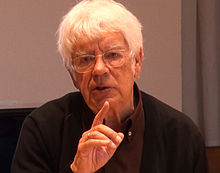Helmuth Rilling
Helmuth Rilling | |
|---|---|
 Rilling in 2013 | |
| Born | 29 May 1933 Stuttgart, Germany |
| Occupations |
|
| Organizations | |
| Awards | Herbert von Karajan Music Prize |
Helmuth Rilling (born 29 May 1933) is a German choral conductor and an academic teacher. He is the founder of the Gächinger Kantorei (1954), the Bach-Collegium Stuttgart (1965), the Oregon Bach Festival (1970),[1] the Internationale Bachakademie Stuttgart (1981) and other Bach Academies worldwide, as well as the "Festival Ensemble Stuttgart" (2001) and the "Junges Stuttgarter Bach Ensemble" (2011). He taught choral conducting at the Frankfurt Musikhochschule from 1965 to 1989 and led the Frankfurter Kantorei from 1969 to 1982.
Education[edit]
Rilling was born into a musical family. He received his early training at the Protestant Seminaries in Württemberg. From 1952 to 1955 he studied organ, composition, and choral conducting at the Stuttgart College of Music. He completed his studies with Fernando Germani in Rome and at the Accademia Musicale Chigiana in Siena.
While still a student in 1954, he founded his first choir, the Gächinger Kantorei. Starting in 1957, he was organist and choirmaster at the Stuttgart Gedächtniskirche, conducting the choir Figuralchor der Gedächtniskirche Stuttgart. From 1963 to 1966, he taught organ and choral at the Spandauer Kirchenmusikschule, conducting the Spandauer Kantorei (Spandau chorale).
Career[edit]
In 1967, he studied with Leonard Bernstein in New York and in the same year was appointed professor of choral conducting at the Frankfurt University of Music and Performing Arts, a post that he held until 1985. In 1969, Rilling took over as conductor of the Frankfurter Kantorei (Frankfurt Choir). Since 1965, he has conducted the Bach-Collegium Stuttgart, which often performs with the Gächinger Kantorei. He has toured widely with both ensembles.
He is well known for his performances of the music of Johann Sebastian Bach and his contemporaries. Rilling is the first person to have twice prepared and recorded (on modern instruments) the complete choral works of J. S. Bach, a monumental task involving well over 1,000 pieces of music - spanning 170 compact discs. He has also recorded many romantic and classical choral and orchestral works, including the works of Johannes Brahms. In 1988, Rilling conducted the world premiere of the Messa per Rossini that he also conducted at the Rheingau Musik Festival in 2001, where he has traditionally conducted the final concert.[2]
Rilling co-founded the Oregon Bach Festival in 1970, and served as its artistic director until 2013.[3] He also co-founded and led the Internationale Bachakademie Stuttgart since 1981. In 2001, Rilling created the Festival Ensemble to be part of the European Music Festival Stuttgart ("Musikfest Stuttgart").[2] Rilling became the Festival Conductor and lecturer at the Toronto Bach Festival in 2004.
Rilling was a teacher of chorale conducting at the Frankfurt Musikhochschule from 1965 to 1989.
Recordings and awards[edit]
Rilling's recording of Krzysztof Penderecki's Credo, commissioned and performed by the Oregon Bach Festival, won the 2001 Grammy Award for best choral performance. He received the Bach Medal in 2004.[4] In 2008, Rilling was awarded the Sanford Award by the Yale School of Music at Yale University. He was the 2011 recipient of the Herbert von Karajan Music Prize.
For Rilling's 75th birthday, his record label Hänssler Classic released his entire Bach edition on iTunes.
References[edit]
- ^ Malone, Andrew Lindemann. "Helmuth Rilling Biography". AllMusic. Retrieved 27 June 2019.
- ^ a b Festival Ensemble Stuttgart Archived 3 March 2016 at the Wayback Machine, 2006 (in German)
- ^ David Stabler (24 August 2011). "Oregon Bach Festival names Matthew Halls to replace Helmuth Rilling in 2013". The Oregonian. Retrieved 11 December 2014.
- ^ "Rilling ausgezeichnet". Schwäbische Post (Press release) (in German). Aalen. dpa. 30 April 2004. Retrieved 4 July 2018.
External links[edit]
- Helmuth Rilling / Gründer der Internationalen Bachakademie Archived 10 August 2016 at the Wayback Machine on the website of the Internationale Bachakademie Stuttgart (in German)
- Helmuth Rilling (Conductor, Organ) on bach-cantatas.com
- vita - fotos of Helmuth Rilling (in German)
- Interview with Helmuth Rilling by Bruce Duffie, 2 March 2000
- 1933 births
- Living people
- 21st-century German conductors (music)
- 21st-century German male musicians
- Bach conductors
- German choral conductors
- German male conductors (music)
- Grammy Award winners
- Herbert von Karajan Music Prize winners
- Kirchenmusikdirektor
- Knights Commander of the Order of Merit of the Federal Republic of Germany
- Musicians from Oregon
- Musicians from Stuttgart
- Recipients of the Order of Merit of Baden-Württemberg
- Accademia Musicale Chigiana alumni
